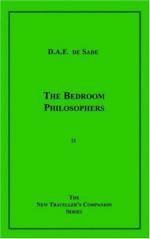
|
| Name: _________________________ | Period: ___________________ |
This test consists of 15 multiple choice questions and 5 short answer questions.
Multiple Choice Questions
1. What is Eugenie's initial reaction to seeing Dolmance in Madame's boudoir in the Third Dialogue?
(a) She is nonplussed.
(b) She is giddy.
(c) She is terrified.
(d) She is livid.
2. At the beginning of this section, what crime does Dolmance admit to?
(a) Treason.
(b) Sodomy.
(c) Rape.
(d) Murder.
3. According to Dolmance in the Fourth Dialogue, mankind was created to be what?
(a) Naked.
(b) Wicked.
(c) Poor.
(d) Polygamous.
4. What is Dolmance's physical proof that nature prefers anal sex?
(a) The anus is possessed by all people.
(b) The anus is tighter than the vagina.
(c) The anus is shaped to fit the penis.
(d) The anus is positioned in line with the genitals.
5. In this section, what does Dolmance declare is the most important mission a young girl can undertake?
(a) Pleasing men.
(b) Drinking and smoking.
(c) Disobeying her guardians.
(d) Sensual pleasure.
6. Which character present or discussed in the First Dialogue is a stand-in for the Marquis de Sade?
(a) Dolmance.
(b) Eugenie.
(c) Chevalier.
(d) Madame de Saint-Ange.
7. According to Dolmance, for a true libertine, every action yields what?
(a) Usefulness.
(b) Wealth.
(c) Pain.
(d) Pleasure.
8. In this section, why does Dolmance insist that Madame de Saint-Ange hurry in her lesson to Eugenie?
(a) He wants to sodomize her.
(b) He thinks she is a poor instructor.
(c) He wants to orgasm.
(d) He wants to introduce Chevalier.
9. In the Fourth Dialogue, what has Madame de Saint-Ange offered 500 sous for?
(a) A copy of the 100 Days on Sodom.
(b) A passion she has not known.
(c) A hundred men at once.
(d) A larger penis than the Chevalier's.
10. According to Dolmance, what is the most pleasurable sexual act?
(a) Vaginal intercourse.
(b) Masturbation.
(c) Fellatio.
(d) Sodomy.
11. What corporal punishment does Dolmance administer to Eugenie early in the Third Dialogue?
(a) Tying down.
(b) Whipping.
(c) Spanking.
(d) Dripping hot wax.
12. Through Dolmance in the Third Dialogue, Sade advocates the destruction of what?
(a) The poor.
(b) Children.
(c) Social mores.
(d) Marriage.
13. Who does Chevalier penetrate immediately after ejaculating in the Fourth Dialogue?
(a) Chevalier.
(b) Augustin.
(c) Madame de Saint-Ange.
(d) Dolmance.
14. According to Madame de Saint-Ange in this section, why are no desires uncommon?
(a) They are all found in nature.
(b) They are all pleasurable.
(c) They are all permitted in libertinage.
(d) They are all lawful.
15. What color is Eugenie's hair?
(a) Black.
(b) Auburn.
(c) Dirty blonde.
(d) Chestnut.
Short Answer Questions
1. Which of the following is not a human activity prohibited by law that Dolmance does not dismiss as permissible?
2. What word does Dolmance excoriate as meaningless at the beginning of this section?
3. When does Madame de Saint-Ange say a women must tell her husband she is taking lovers?
4. Near the end of the Third Dialogue, Madame de Saint-Ange says that, along with abortion, what is permissible regarding unwanted children?
5. According to Dolmance, what does God have no reason to do?
|
This section contains 482 words (approx. 2 pages at 300 words per page) |

|




